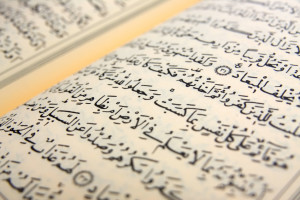
السلام عليكم ورحمة الله و بركاته,
We’ve been looking at some of the finer details of grammar. Let’s switch gears a little bit and take notice of some subtleties in the Quran.
Today we’re looking at two names that are used for the Quran: قُرْآن (recitation) and كِتاب (book)
We see the word قُرآن used by itself, as in
ان هذا القران يهدي للتي هي اقوم ويبشر المؤمنين الذين يعملون الصالحات ان لهم اجرا كبيرا
Indeed, this Qur’an guides to that which is most suitable and gives good tidings to the believers who do righteous deeds that they will have a great reward. (17:9)
We also see the word كِتاب used by itself, as in
ذلك الكتاب لا ريب فيه هدى للمتقين
This is the Book about which there is no doubt, a guidance for those conscious of Allah – (2:2)
We also see them come together, as in
[79]انه لقران كريم[77] في كتاب مكنون[78] لا يمسه الا المطهرون
Indeed, it is a noble Qur’an. In a Register well-protected; None touch it except the purified. (56:77-79)
Preservation of the Quran through reading and writing
There are some gems that appear to us from the usage of these two names (قرآن and كتاب), including the following:
- These names are manifestations of how Allah’s speech was protected from distortions and alterations, as they preserve by way of recitation and writing
- These two name are examples of the most important ways that documents and texts are preserved. When someone wants to preserve a text, he first recites it, then memorizes it, then writes and records it. If he forgets, he goes back to his sheets.
The Quran is the most divine document for the Islamic nation, and Allah inspired the Companions to use these two ways of preservation: recitation and writing. The Quran was memorized by a great number of the Companions, just as it was written using the tools during the time of the Messenger صلى الله عليه و سلم
The Muslims then continued on this path and recitation and writing persisted via writing copies, printing them and spreading them.
What’s memorized is checked by what’s written down. When one who has memorized the Quran recites it, the person following him looks in a copy. At the same time, what’s written is checked by what’s been memorized. When a copy has been printed, it’s submitted to a scholar and memorizer to check and look into.
In that way, we don’t rely on a recitation that doesn’t match what’s written down, and we don’t depend on a copy that doesn’t match what’s been preserved by memory.
These two methods, recitation and writing have not been afforded to any book, document or text in the whole of human history like they have been to the Quran! Nothing else deserves these two names like the Quran does.
Recitation and writing are a gathering of the Quran
Recitation (قراءة) and writing (كِتابة) are each a gathering of the Quran in one form or another.
The word قِراءة is derived from the word القَرْء, which means collecting and putting together. When a reciter recites verses from the Quran, he’s gathering the words of the verse, putting their letters together and then bringing the sound out of his mouth, all collected and joined together. So, recitation is an oral collection of the words and letters of the Quran
The word كِتابة is derived from the word الكَتب, which also means collecting and putting together! When the scribe is writing the verse on a sheet, he joins the letters of the words and the words of the sentences to each other on the line of the page using his pen. So, writing is a collection of the words and letters of the Quran on lines.
How great is Allah who chose these two names for His noble speech that was sent down upon His messenger صلى الله عليه و سلم!
Like this post? Simply enter your e-mail and click “Yes, include me!” for updates
hi Sir,
good work i love your work.
Regard